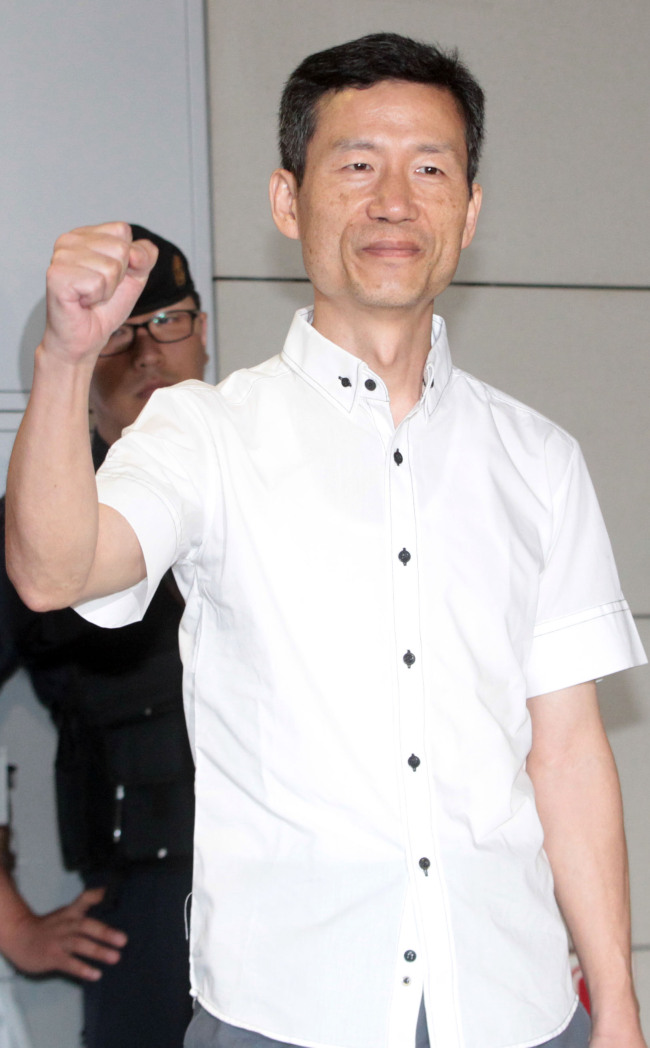Kim Young-hwan, the prominent anti-North Korea activist freed Friday from detention in China, pledged to continue his fight for democracy and human rights in the communist country.
Kim, 49, and his three colleagues arrived in Seoul on the same day China expelled them after 114 days of detention. They were arrested on March 29 in the northeastern border city of Dalian apparently for helping North Korean refugees. They were charged with “endangering national security.”
“The reality in North Korea is that it is suffering from a brutal dictatorship and horrendous human rights situation,” Kim told reporters upon arrival at Incheon International Airport.
“At a time when far-away countries strive for North Korean human rights and democratization, as a fellow Korean it is my right and duty to do so.”
 |
Kim Young-hwan gestures on his arrival at Incheon International Airport on Friday. (Yonhap News) |
Kim’s detention attracted heavy public and media interest for his dramatic life. In the 1980s, he was a pro-North Korea movement leader playing a key role in disseminating Pyongyang’s philosophy of “juche,” or self-reliance.
He turned to activism against the coercive regime’s human rights abuses in the 1990s and is currently a senior researcher for the Seoul-based Network for North Korean Democracy and Human Rights.
The other crusaders are Yoo Jae-gil, 43, Kang Shin-sam, 41, and Lee Sang-yong, 31.
His release may place North Korea under greater pressure over human rights issues amid growing international criticism over its harsh punishment of repatriated defectors and political prisoners, observers say.
China, the North’s lone major ally, has also been blamed for deporting North Korean asylum seekers despite the torture, labor camps or public executions they face back home, calling them “illegal economic migrants.”
With Pyongyang’s tighter border control and China’s crackdown on illegal immigrants, however, concerns have arisen that North Korean defectors hiding there could become more exposed to abuses.
Open Radio for North Korea reported early this year that about 20,000 additional North Korean soldiers have been mobilized to border regions, warning severe penalties for those who get caught fleeing.
In March, Beijing launched a nationwide crackdown on foreigners who illegally crossed borders, gained jobs and overstayed their visas.
More than 23,500 North Koreans have sought asylum in the South since the end of the 1950-53 Korean War, according to the Unification Ministry. The figure steadily rose each year from 1,383 in 2005 to 2,927 in 2009, although it slid to 2,376 in 2010 due to strengthened border security.
In the State Department’s report on human rights in 199 countries released late last month, North Korea was rated as “extremely poor” and remained at the bottom of the agency’s list along with China, Iran, Syria, Turkmenistan, Uzbekistan and Belarus.
The North has rebuffed accusations of its rights abuses, which it bills as an attempt to oust its government.
By Shin Hyon-hee (
heeshin@heraldcorp.com)






![[Herald Interview] 'Trump will use tariffs as first line of defense for American manufacturing'](http://res.heraldm.com/phpwas/restmb_idxmake.php?idx=644&simg=/content/image/2024/11/26/20241126050017_0.jpg)
![[Exclusive] Hyundai Mobis eyes closer ties with BYD](http://res.heraldm.com/phpwas/restmb_idxmake.php?idx=644&simg=/content/image/2024/11/25/20241125050044_0.jpg)
